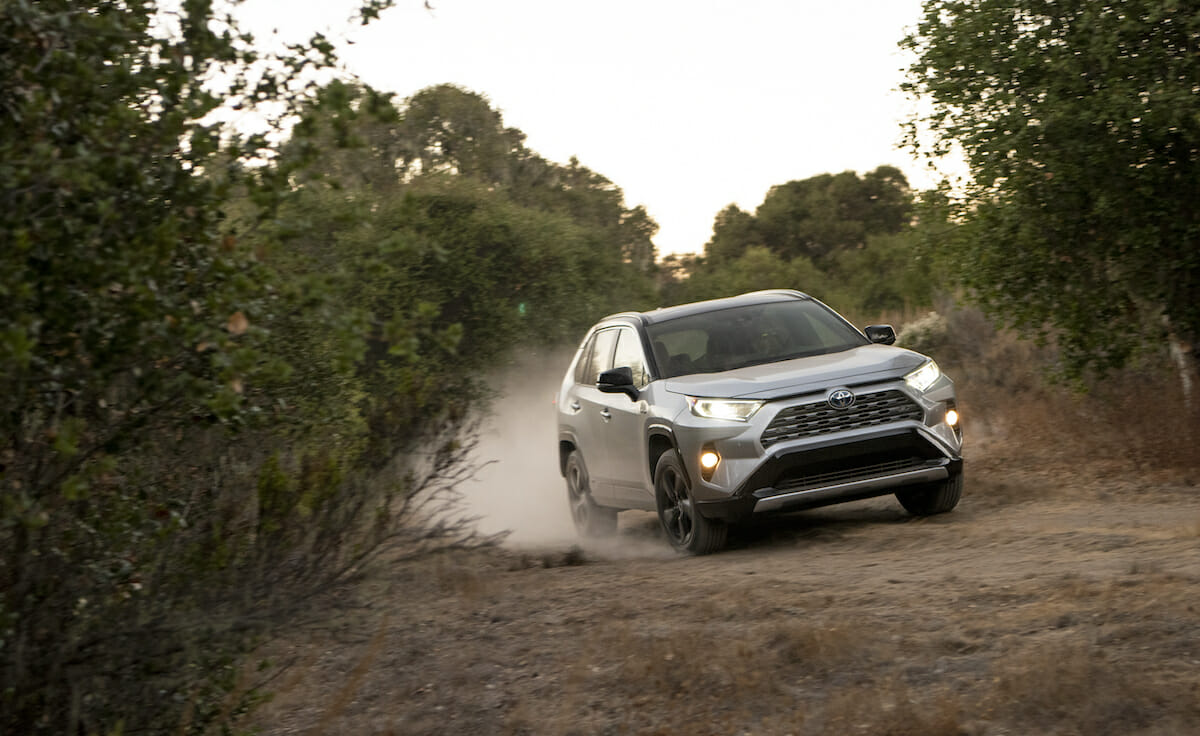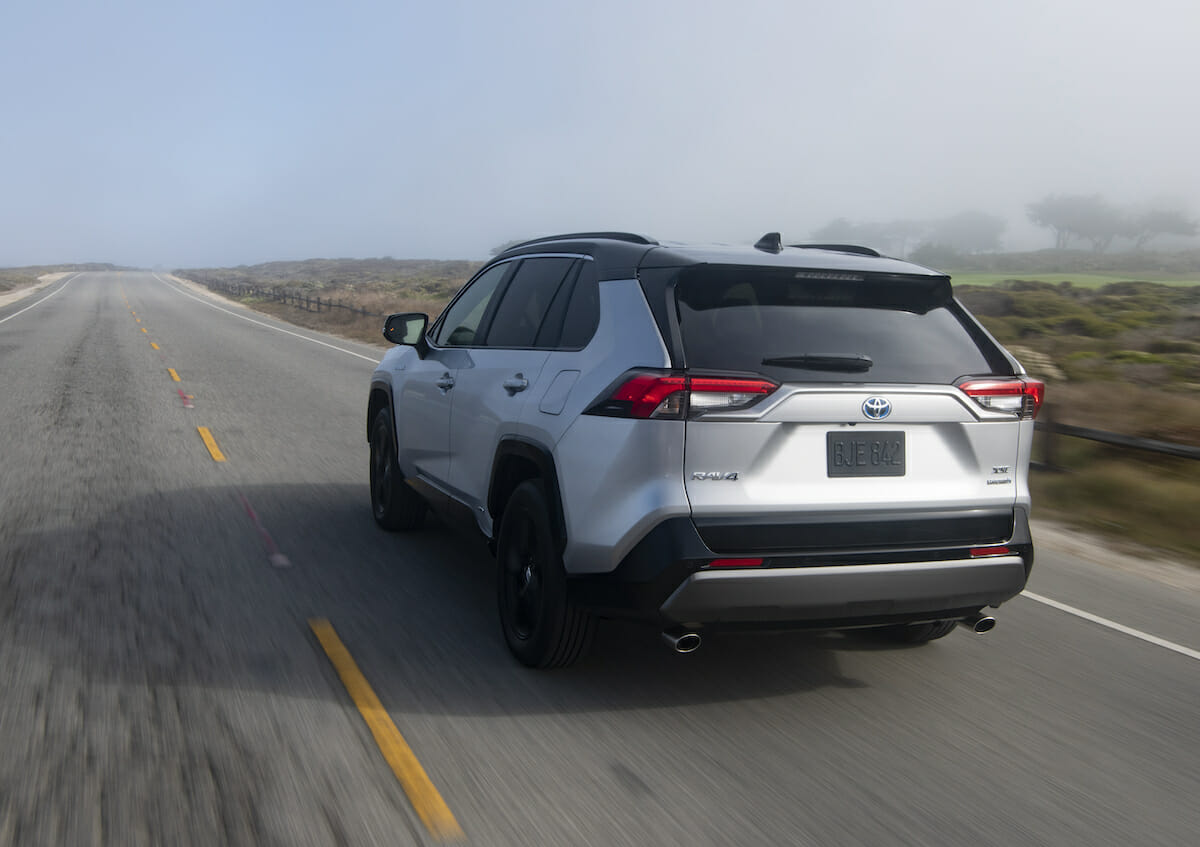If you’d like to own a compact SUV, the Toyota RAV4 easily checks all the boxes. It has a comfortable cabin space, plenty of performance, and safety feature galore. In fact, it’s so safe that it regularly wins the IIHS Top Safety Pick designation and other awards.

How safe is the 2020 Toyota RAV4?
The 2020 Toyota RAV4 received a 5-star overall safety rating from the NHTSA and a “Good” score from the IIHS. Combine that with 4.41 star owner and 4.8/10 expert review ratings from Vehicle History and you have a real winner on your hands.
The Toyota RAV4’s safety doesn’t come down to crash test ratings alone. Its high-tech safety features also play a role in its overall build quality. By exploring both of these areas, you can see for yourself just how safe this compact SUV is overall.
2020 Toyota RAV4 Crash Test Rating
Both the Insurance Institute for Highway Safety (IIHS) and National Highway Traffic Safety Administration (NHTSA) have completed their crash tests on the 2020 RAV4. Their results show just how well this compact SUV can withstand collisions of various kinds. Here’s a look at their scores.
Insurance Institute for Highway Safety
The 2020 Toyota RAV4 earned a “Good” rating overall in the IIHS crash tests. Its crashworthiness is nothing less than impressive and the same goes for its LATCH ease of use.
“Superior” ratings were given to both its vehicle-to-vehicle and vehicle-to-pedestrian front crash prevention systems. Only the headlamps were lacking on certain models, though the curve-adaptive LED headlights performed the best and earned a “Good” score.
National Highway Traffic Safety Administration
The NHTSA gave the 2020 RAV4 a stunning 5-star crash test rating after running its full gamut of tests. On the front crash tests, it earned five stars for the passenger side and four stars for the driver’s side.
The rollover tests revealed a rather low 15.5% risk of rolling during a crash and four-star rating overall. With five stars awarded across the board, the side crash tests showed the complete structural integrity of this vehicle.
Although the ability to withstand a collision is important, the safety suite also helps keep you and your passengers safe on your travels.
Safety Tech Available for the Toyota RAV4
The 2020 Toyota RAV4 has the full Safety Sense 2.0 suite as standard equipment.
The driver assist features that come with this suite include:
Pre-Collision System
The Pre-Collision System promises to watch out for you on all your travels. Using its high-tech camera and radar system, it keeps an eye out for obstructions in the roadway. It not only watches for other vehicles, but also pedestrians and bicyclists. If it notices any hazards, it gives you a warning, and then presses the brakes to prevent an accident if you do not respond right away.
Automatic High Beams
While driving at night, Automatic High Beams can provide a clear view ahead without impacting other drivers. These high beams work by watching for oncoming traffic and switching to low beams as needed to keep everyone safe.
Dynamic Radar Cruise Control
Dynamic Radar Cruise Control automatically adjusts your vehicle’s speed to keep you cruising along safely mile after mile. You just put in your set speed and activate the system, and then your car will handle the rest.

While you steer, it watches your distance from the vehicle ahead and slows down if necessary to avoid a crash. Once they get out of the way, it accelerates back up to the set speed. Depending on your transmission type, it either works all the way down to a stop or to just 15 mph.
Lane Departure Alert
The Lane Departure Alert helps keep you from drifting out of your lane and getting into an accident. This system watches the markings on the roadway and sends out an alert if you go over them. It can also watch for the edge of the road on unmarked streets.
If you do not respond right away, then the Steering Assist kicks in to get you back on track. It provides small inputs that keep you from going outside the lines as you travel down the roadway.
Road Sign Assist
Missing road signs is a thing of the past with Road Sign Assist installed. This system continually scans for signs, and then displays any you come across on your dash. That way, you can adjust your speed, yield to traffic, or make any other moves needed to keep you safe on your travels.
All these driver assist technologies work together to make every drive as safe as possible. With that support, you can focus on making the most of your adventures and enjoying every mile of the trip.
Other Questions People Also Ask Include:
Are there any Recalls on the Toyota RAV4?
As with all makes and models, the Toyota RAV4 often has recalls come up across the model years. The latest recall is for the 2020 model and revolves around a faulty power steering box. Repairs began in August and will continue until the problem is resolved.
What Problems Does the Toyota RAV4 Have?
Toyota RAV4s occasionally have serious problems affecting their engines. The 2.5L engine, in particular, is prone to leaking coolant due to cracks in the engine block. The coolant may then leak into other parts of the engine and onto the ground.
What Does the 4 Stand For in RAV4?
The 4 in RAV4 stands for four-wheel drive. When this model was first released, all variants came in four-wheel drive. Since then, that’s changed, but the name stuck around.
Can You Off-Road in a RAV4?
Although it’s not the top choice, you can go off road in a RAV4. In fact, the 2019 model comes with special modes for driving on rocks, dirt, mud, and sand, so you can keep your steady footing on all your adventures.
Is the RAV4 a Reliable Car?
The RAV4 is well known as a truly reliable car that needs minimal work through the years. As long as you complete its maintenance tasks on time, it’s not prone to failing and leaving you stranded on the side of the road.
Photos: Toyota